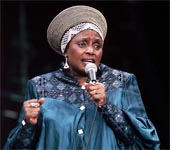Mama Africa dies as she lives: lilting against tyranny
 Johannesburg - Miriam Makeba, South Africa's "Mama Africa", who died at 76 in Italy on Sunday, was the much-loved voice of her country's anti-apartheid struggle during her long years in exile and an ambassador for African music in the West.
Johannesburg - Miriam Makeba, South Africa's "Mama Africa", who died at 76 in Italy on Sunday, was the much-loved voice of her country's anti-apartheid struggle during her long years in exile and an ambassador for African music in the West.
Born outside Johannesburg on March 4, 1932, in Soweto township, Makeba was the first female African musician to receive a Grammy award, which came in 1966 for her album with Calypso king Harry Belafonte, entitled An Evening with Belafonte/Makeba.
The Grammy was one of many high notes in a twin-track career of music and activism spanning half a century.
South African townships were steeped in jazz when Makeba began singing professionally in the 1950s, first with a group called the Manhattan Brothers, then with her own group, The Skylarks, which fused jazz and traditional melodies.
Her first break was when she performed in the musical King Kong in 1959 alongside jazz trumpeter Hugh Masekela, her future husband.
The show, in which Makeba played a "shebeen queen" (owner of an illegal township drinking den), played in London's West End, launched Makeba's international career.
In 1960, Makeba was banned from South Africa by the apartheid regime. By then she had met Belafonte, who helped her gain entry to the United States and promoted her music.
It was in the US that Makeba recorded some of her most famous hits, such as Pata Pata and The Click Song - a humourous journey through the sounds of her native Xhosa tongue.
Makeba, who spent a total of 31 years in exile, also used her gravel voice and traditional African garb and melodies to shine a light on the suffering of black South Africans.
In 1968, following her divorce from Masekela, Makeba married Trinidian activist, Stokely Carmichael. The relationship with the Black Panthers leader cost her recording contracts and led to the plug being pulled on her concerts, forcing her to leave the US.
Makeba and Carmichael moved to Guinea in West Africa on diplomatic passports, where she remained after their split in 1973.
In 1987, Makeba joined Paul Simon on his Graceland tour, memorably leading a packed Zimbabwean stadium of waving clenched fists (the African National Congress symbol) in Nkosi Sikelel iAfrika (God Bless Africa), the hymn of the anti-apartheid struggle.
She returned to South Africa in 1990 at the invitation of former president Nelson Mandela, who was released from prison that year, the year the curtain came down on three centuries of white supremacist rule.
In 2006, the doyenne of African music took her leave from the stage with a farewell tour through 10 countries. But she continued to perform in festivals and benefit concerts at home and aboard.
"Some say I'm retiring but you never really retire as a singer," she said at 75.
Makeba performed mainly in English and Xhosa but also had Portugese, Spanish and Yiddish songs in her wide repertoire.
Her death of a heart attack, which followed a struggle with arthritis, was a fitting tribute to her life.
Makeba collapsed just after leaving the stage at a concert near Naples in aid of an author Roberto Saviano, who life had been threatened by the mafia.
"Throughout her life, Mama Makeba communicated a positive message to the world about the struggle of the people of South Africa and the certainty of victory over the dark forces of apartheid (and) colonialism through the art of song," Foreign Minister Nkosazana Dlamini-Zuma said. (dpa)